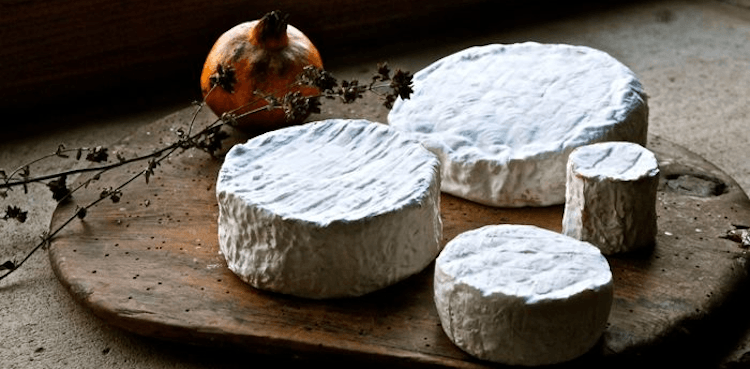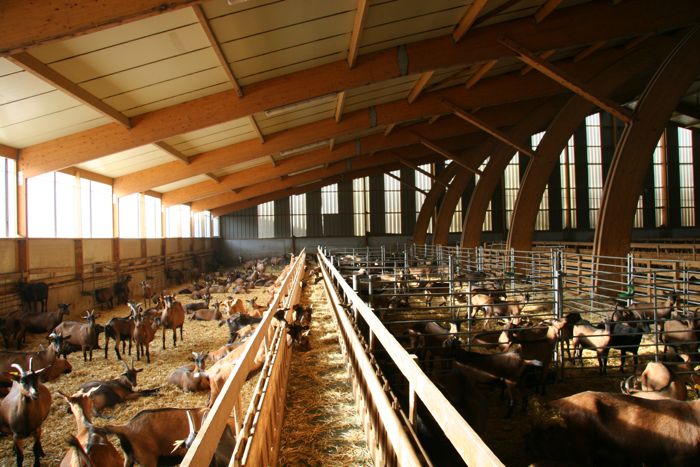
Sustainability can be a problem at many dairies, but in this blog series intern Alicia gets the deets on some eco-friendly cheesemakers from across the map. Find out what makes each cheese green, and enter the weekly contest for a chance to win an issue of culture.
We’ve talked about it before: sustainability is a global issue. It’s something that both domestic and international cheesemakers should be thinking about and working to improve. And what would this Green Cheese series be without talking to someone beyond the US border?
Enter family-owned Spanish creamery Santa Gadea. Touted as the first farm in Europe to be 100% sustainable and organic, they are also completely carbon negative—an impressive feat for dairy housing 1,300 French Alpine goats. Founded by Alfonso Pérez-Andújar and staffed by less than 15 people, the farm is located in San Cristóbal de Rioseco and focuses on both traditional and less conventional environmental strategies to reduce emissions. Though they’ve owned the property for 12 years, they’ve only been seriously producing cheese for the last two and a half years.
I spoke with Marta Milans, vice president of the dairy and daughter of Pérez-Andújar. “My dad’s passion for nature and trees is insane,” she says. This is good news, considering that their large property is very lush and green. Pérez-Andújar want to keep as much of the natural forest as possible, and began his reforestation efforts several years ago. Milans explains that “variety is important, because that way the fauna has many more options. You create a much healthier animal.” Over 120,000 trees have been planted to date, many of them pine or walnut. All of that extra greenery removes carbon dioxide from the atmosphere, to which Milans simply says, “It’s a beautiful thing to do, to give back to Earth that way.”

Chart from Santa Gadea
Along with reforestation, the farm features solar and wind farms, in addition to less traditional eco-friendly techniques. Pérez-Andújar is a big fan of effective micoorganism (EM) technology. Discovered by a Japanese scientist in the 1980’s, EM technology is a precise combination of three types of bacteria—phototrophic bacteria, lactic acid bacteria, and yeasts. Milans explains, “In a certain combination, it regenerates soil and earth in an incredible way.” When applied in the correct ratios to manure, bacteria will feed off gases, which reduces methane and carbon dioxide emissions by 40 percent and speeds up the process of turning manure into usable compost.

Chart from Santa Gadea
Milans explains that this EM technology can have very diverse uses. “Once my dad discovered this, he decided to bring that technique into our farm. We spray all of our soil with it, we spray the food we feed our goats, and that’s part of the reason our goats are so healthy.” For the very brave, Milans also adds that people “can take shots of it and it regenerates all your intestinal flora.”
Besides the environment, the farm also places emphasis on family: Milan’s father Alfonso, the patriarch of the family, founded the business and strives to be eco-friendly. Marta’s mother makes the cheese, and her siblings (a marine biologist and renewable wind energy specialist) both help with the more technical ecological aspects of the farm. Milans herself works to find distributors and importers. Santa Gadea is already widely sold in European countries like Germany, Sweden, and England, and Milans recently signed a contract to begin selling their cheese in US Whole Foods.
And Pérez-Andújar has passed down his environmental views to his children. But perhaps Milans puts it best, simply saying, “You want to really respect nature. You have to work with it, not against it.”
This week’s contest question is: What values would you like to pass on to your family? Submit your answer in the comments below by Thursday, April 17th at 12:00p.m. EDT for a chance to win the current issue of culture. The winner will be chosen at random and announced in next week’s Green Cheese post.
Tune in next week to read the conclusion to the Green Cheese series, and find out how you could win a year’s subscription of culture!






What values would you like to pass on to your family? I would like to pass on the value that we might pay a heavy price to live the life we love, but in the end happiness is truly priceless. I feel it is important for us as an entire species to stop hurting our planet. As far as we know it is the only one with the capacity to support us, in the manner we seem to most need. I do know that the Earth will survive without us, but we will not.
“Going green” and “sustainable living’ can have such different connotations for everyone. I want to pass on healthy land, healthy food and healthy life, and do it with style and grace.
Being stewards and protecting the earth and all that live and grow on on this beautiful garden is the key to a healthy past, present and future. My children have been taught this from an early age and I hope it continues, and stays in their mind and actions always.
I think the animals, and the farm, would benefit from being out on pasture rather than confined in a barn. Of course, it wouldn’t be as financially rewarding. This is obviously a confinement dairy, no matter how many trees they plant.
One simple way to live…Humans belong to the Earth, the Earth does not belong to them.
I want to offer my children and grandchildren HOPE. Despite seeing the world in such a mess, environmentally, emotionally, and ethically… I wish to instill in them the knowledge that ONE person can make a difference. That raising their children as aware and caring people, can change the coming generation, and perhaps… save our planet
Besides treating people with respect, etc. etc., I would hope that they would learn that cooking your own meals from scratch can be the most satisfying way to eat even as it helps contribute to less waste and subtle improvement on the existing food distribution channels; if they aren’t buying so much boxed and canned items,then its a win-win for the environment and their own health.
Supporting local food, searching out food co-ops, supporting sustainable businesses like these.
The value of a multi – generational home where all members are valued for their talents and wisdom, all members are supported and all members thrive while being surrounded by love.
When I was six years old, my parents bought a 12 acre farm. Their passion was to grow and raise organic. We as a family planted a acre garden,Orchard,and Raspberry ,blueberry , strawberries, elderberry and currents.15,000 tomatoes plants,20 rows of grapes.Chickens,two calves, and two piglets. This was a new beginning to appreciate our time together on the farm. The responsibility and commitment was HUGH! Grapes were picked and sold to Welches in NorthEast, PA.Tomatoes was picked and some sold to local stores and the ripper ones sold to Heinz in PA.
It didn’t end there, my mother and I would Can, Freeze and dehydrate the garden of vegetables and fruits.
Its sounds like a lot of work, which it was, but it was a family team effort that made it work. I myself believe solely on oraganic.My family had the best farm in the county, because we were Happy to work together.
The value of taking time for family dinners, time to communicate with each other about what’s happened in the course of the day.